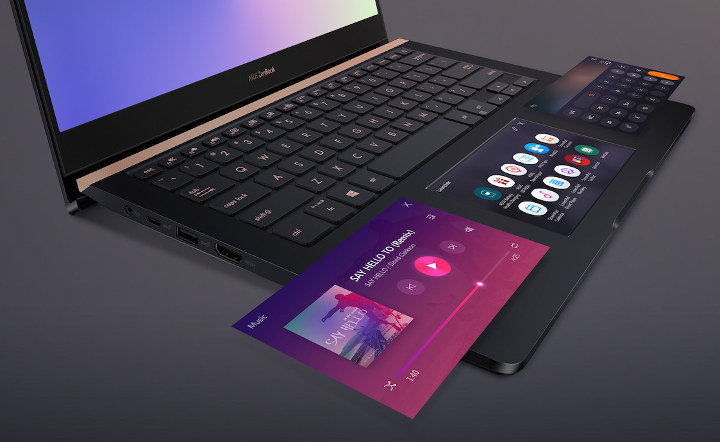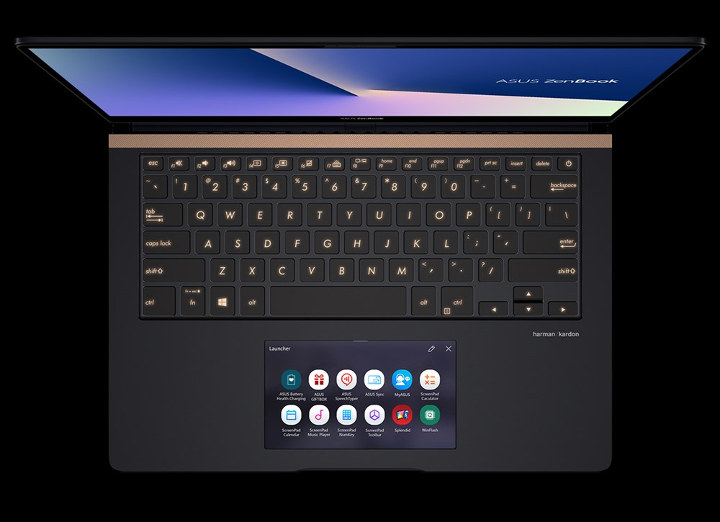Touchpads is a feature found in most laptops, but AFAIK there’s not been much innovation recently apart from maybe support for multitouch and gestures. But I’ve just found out ASUS started to showcase laptops without touchpad a few months ago, instead integrating what the company calls a ScreenPad, a 5.5″ touchscreen display placed at the location where you’d normally expect a touchpad.
The company’s latest (and second) laptop with a ScreenPad is Asus ZenBook Pro 14 UX480FD, which comes with a 14″ display, processor up to an Intel Core i7-8565U Whiskey Lake-U processor, up to 16GB DDR4 RAM, and up to 1TB PCIe SSD storage, as well as an NVIDIA GeForce GTX 1050 Max-Q graphics, 802.11ac WiFi, Bluetooth 5.0, and more. You can visit the product page for the full specs, as I’ll focus a bit more on the ScreenPad in this post.
The ScreenPad in this laptop is a 5.5” FHD (1920 x 1080) Super IPS+ display, with 178 wide-view technology, glass-covered for fingerprint and smudge resistance, and featuring precision touchpad (PTP) technology supporting up to four-finger smart gestures.
 Pressing the F6 key on the keyboard will switch to three modes for the ScreenPad:
Pressing the F6 key on the keyboard will switch to three modes for the ScreenPad:
- ScreenPad mode – This mode gives you access to ScreenPad apps with a launcher, a toolbar, a music player, a YouTube based online video player, calculator, calendar, ScreenPad Office working with Word, Excel and PowerPoint, and other apps that can be installed via an app store.
- Screen Extender mode – The ScreenPad just acts as a small secondary display, which could be used to keep an eye on emails or social media feeds for example.
- Touchpad mode – Acting as a standard multitouch, gesture capable touchpad
ASUS has posted a short tutorial video that describes clearly what can be done with the ScreenPad.

Speaking about pricing, we still don’t know how much the Zenbook Pro 14 UX480FD model will go for, but the earlier – and more powerful – Zenbook Pro 15 is said to cost $1,799 and up depending on configuration. Neither models appear to be for sale online right now.
Via Liliputing

Jean-Luc started CNX Software in 2010 as a part-time endeavor, before quitting his job as a software engineering manager, and starting to write daily news, and reviews full time later in 2011.
Support CNX Software! Donate via cryptocurrencies, become a Patron on Patreon, or purchase goods on Amazon or Aliexpress






Wow. Great not only Apple is known for such “innovations”. Patent pending on this innovation i guess?
See now, if this wasn’t Asus but Wacom, I’d venture to guess this thing would be pretty great for artists.
Nextstep : do this with the smartphone… https://www.mirror.co.uk/tech/remarkable-apple-patent-shows-your-10089403
(or even better : use the whole smartphone as the main computer and consider the “laptop” merely as a dock with battery+screen+keyboard+connectors. With a Snapdragon845 + 8G RAM + fast eMMC in smartphones this is now realistic. I only wish smartphones would expose more I/O from the SoC to enable direct HDMI and GPIOs and others )
Also covered here 🙂
https://www.cnx-software.com/2017/03/29/your-smartphone-could-become-the-brain-and-touchpad-of-your-laptop-dock/
Budget tablets are not doing too bad for £135.00
https://www.banggood.com/Original-Box-ALLDOCUBE-M5-64GB-MTK-X20-MT6797-Deca-Core-10_1-Inch-Android-8_0-Tablet-p-1293906.html?rmmds=search
Only 4 GB ram though.
I think Razer was showing off a working-concept/prototype of this for their razor phone at CES 2018, under the name ‘Project Linda’. Not sure how they planned to deal with the Apple patent, though.
Why bother having a keyboard at all?
Just put in another 14″ touch display, with a nice image of the keys.
and a much bigger battery, of course…
As a ex zx81 user, trust me a keyboard is best!
Lenovo had a laptop that replaced the keyboard with a big Wacom-style touchpad and the new model will come with an eink display where the keyboard was. Might be interesting for taking notes but kinda pricey.
https://www.theverge.com/2018/8/30/17788476/lenovo-yoga-book-c930-dual-e-ink-screen-price-photos-release-date-ifa-2018
I guess it’s ok if you look at the keyboard while you type. I have to disable any touchpad to make a laptop usable myself.
You realize you can configure both your OS and the touchpad driver to disable it while the keyboard is in use, right?
And I’d say this should be ok for pretty much any human bean: looking at another screen at the base of the laptop shouldn’t differ too much from having a second monitor or using your phone while on the computer, if it will end up justifying the cost, that remains to be seen.